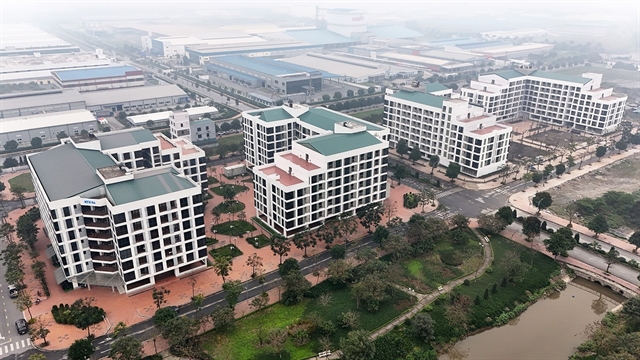 Society
Society

 |
| Social housing blocks under construction in Hà Nam Province. — VNA/VNS Photo |
HÀ NỘI — Việt Nam’s ambitious goal of constructing one million social housing apartments (SHAs) by 2030 faces significant setbacks, as the country built only 21,000 units in 2024, a figure far below the annual target of 130,000.
Experts are increasingly concerned that the milestone is becoming unattainable at such a slow pace.
According to the Ministry of Construction, Việt Nam built just 38,000 SHAs between 2021 and 2023. To meet the 2030 goal, the country must accelerate the construction of SHAs to at least 130,000 SHAs per year over the next seven years.
However, the slow progress over the past year has exposed major challenges in policy implementation, funding, and land allocation.
Real estate expert Nguyễn Văn Đỉnh highlighted that most SHAs have been built by private real estate developers who finance projects independently. In contrast, government-funded SHA developments remain minimal.
This reliance on private enterprises has made the sector highly sensitive to issues such as complex legal procedures and limited access to land.
"The legal process for SHA projects requires at least two years, and construction itself takes another 18 to 24 months," Đỉnh explained.
"This extended timeline hinders developers’ ability to recoup their investments promptly, making SHA projects less attractive."
Local governments have also been slow to allocate land for SHA projects, further complicating efforts.
While demand for SHAs in major cities is high, Hà Nội has met only 9 per cent of its target, HCM City 19 per cent, and Đà Nẵng 43 per cent.
Vương Quốc Toàn, chairman of Lan Hưng Real Estate Group JSC, underscored these difficulties, noting that some SHA projects have faced approval delays spanning decades.
Additionally, financial challenges continue to deter developers. Many rely on external funding but struggle to access low-interest loans. Việt Nam’s VNĐ120 trillion (US$4.7 billion) credit package for affordable housing remains largely under utilised due to complex borrowing requirements.
"Simplifying processes and creating transparent guidelines are crucial steps to boost investment in this sector," Toàn said.
To accelerate SHA development, Đỉnh suggested the Government repossess land from inactive SHA projects and either auction it to new investors or directly invest in it using public funds.
Local authorities are called to allocate more land for SHA projects. He said strategic infrastructure development in these areas could also attract private investment.
He also suggested providing developers with access to low-interest loans with interest rates as low as 4 per cent to enhance the appeal of SHA projects. Simplified loan application processes could further encourage participation.
Nguyễn Văn Đính, deputy chairman of the Vietnam Real Estate Association, emphasised the importance of accelerating the implementation of the Land Law and Housing Law to eliminate procedural delays.
"SHA development needs to transition from a passive to an active approach," Đính said.
He also called for recognising and rewarding developers and local governments that excel in SHA projects, creating role models for others.
Experts also pointed to financial constraints as a key obstacle. Economist Đinh Trọng Thịnh suggested reducing interest rates for SHA loans to below 6 per cent for developers and below 4.5 per cent for homebuyers.
This would make projects more accessible to low-income households while encouraging developers to invest.
He also urged local governments to prioritise SHA projects, streamlining procedures for land clearance and construction, and ensuring timely delivery of materials.
"Achieving the one-million-SHAs target is only possible with a complete overhaul of the system," Thịnh said.
"This includes reducing red tape, enhancing public-private partnerships, and fostering a more supportive investment environment."
The 2024 Capital Law offers a potential solution by allowing Hà Nội’s local government to allocate city funds for technical infrastructure in SHA projects.
Experts believe such legislative initiatives could significantly accelerate development. — VNS